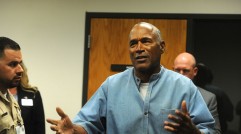Arizona Governor Vetoes Bill Shielding Police Officers' Identities, Says It 'Could Result in Unforeseen Problems'
Arizona Gov. Doug Ducey on Monday vetoed legislation that would have shielded the identities of police officers involved in fatal shootings for 60 days, Reuters reported. The Republican said the bill legislators passed last week was well-intentioned, but it fell short of achieving its stated objectives.
"I know the goal of this legislation is to protect officers and their families, and it's a goal I share," Ducey said in a letter explaining the veto, according to The New York Times. "Unfortunately, I don't believe this bill in its current form best achieves the objectives we share, and I worry it could result in unforeseen problems."
Supporters of the legislation noted they were worried of potential death threats and harassment against police officers in the wake of several recent fatal police shootings in Arizona and killings, such as those in Ferguson, Missouri, which sparked violent protests.
The bill mandated a 60-day delay before the names of officers could be released if they used deadly force and their actions resulted in either death or serious physical injury.
The Arizona police chiefs' association criticized the effort, arguing it would undermine the authority of local law enforcement officials to decide whether identities should be withheld. The Arizona Police Association, meanwhile, blasted the governor's decision to veto the bill, NBC News noted.
"We certainly have a governor who made it clear that the safety of police officers and their families are not his number one priority," said Joe Clure, the president of the roughly 10,000-member group.
Ducey, the son of a policeman, said the "unintended consequences" of shielding officers in such sensitive cases outweighed the benefits.
"The wrong officer's name could circulate. Speculation replaces fact. It's very easy to see news outlets running with information that is unconfirmed or erroneous, and under this proposed law, police chiefs' hands would be tied and they would have no way to respond or set the record straight," the governor wrote.
"The result could be the exact opposite of what this bill aims to do, escalating -- rather than deescalating -- the situation and potentially putting completely innocent officers' reputations and safety on the line."
Subscribe to Latin Post!
Sign up for our free newsletter for the Latest coverage!
* This is a contributed article and this content does not necessarily represent the views of latinpost.com














